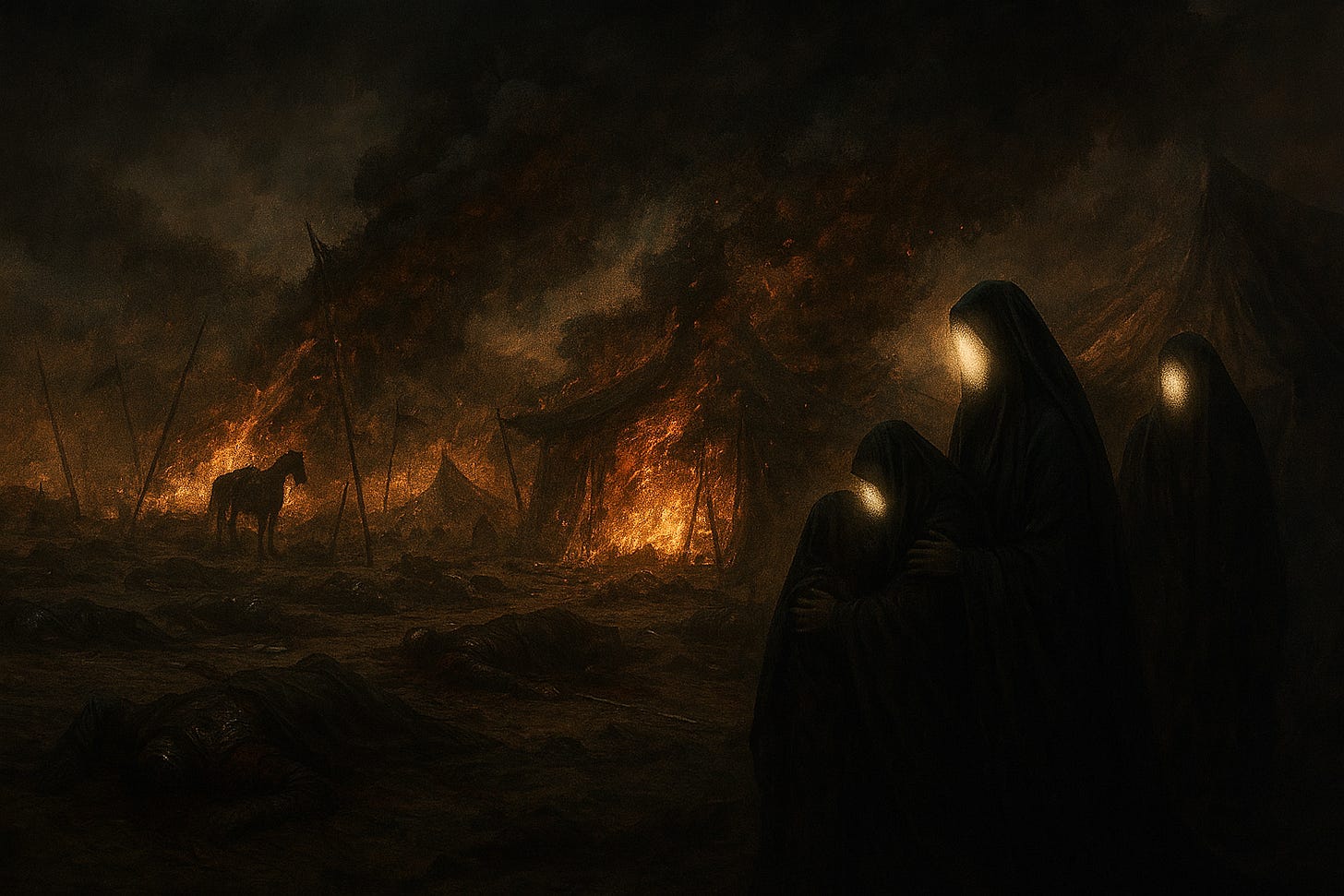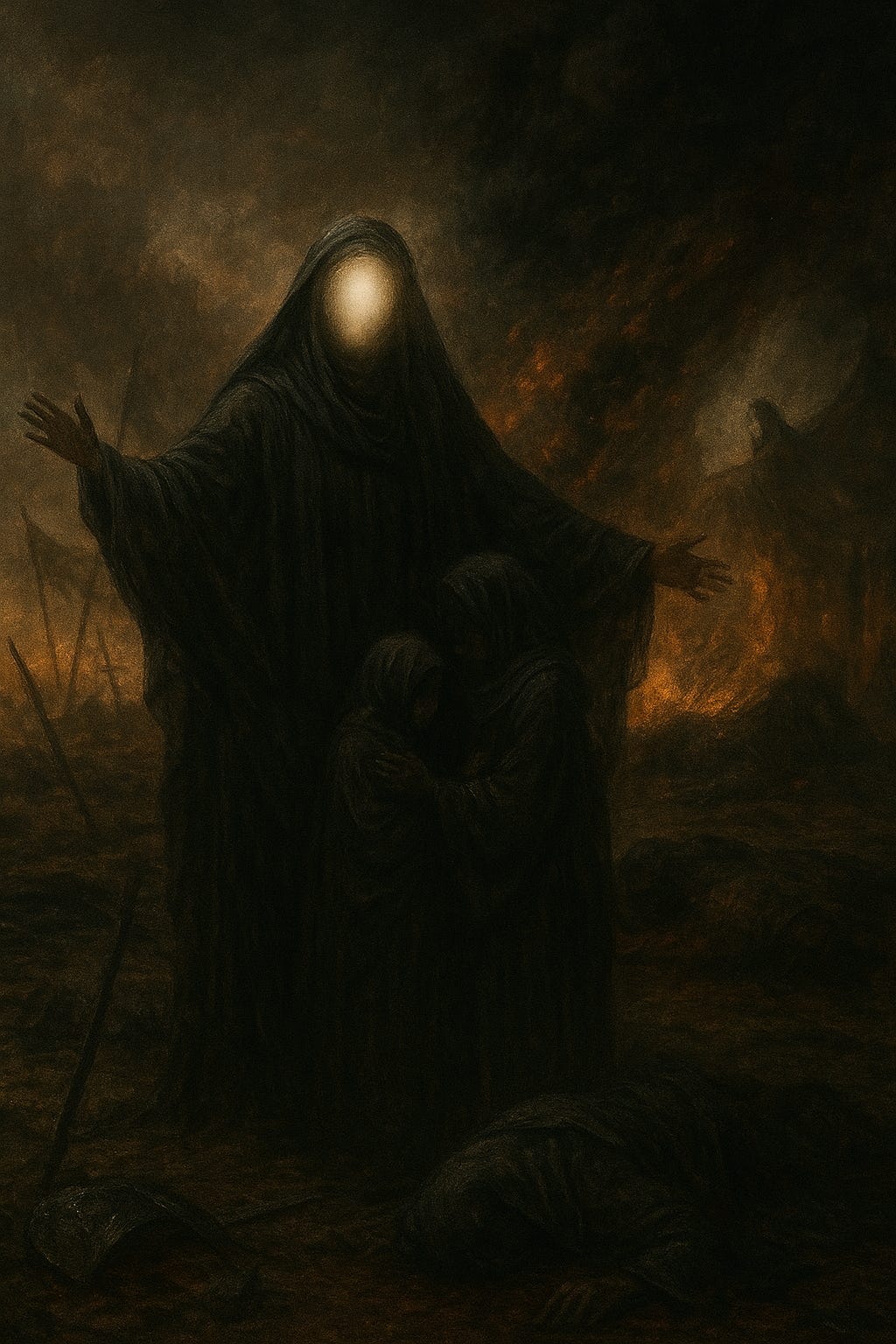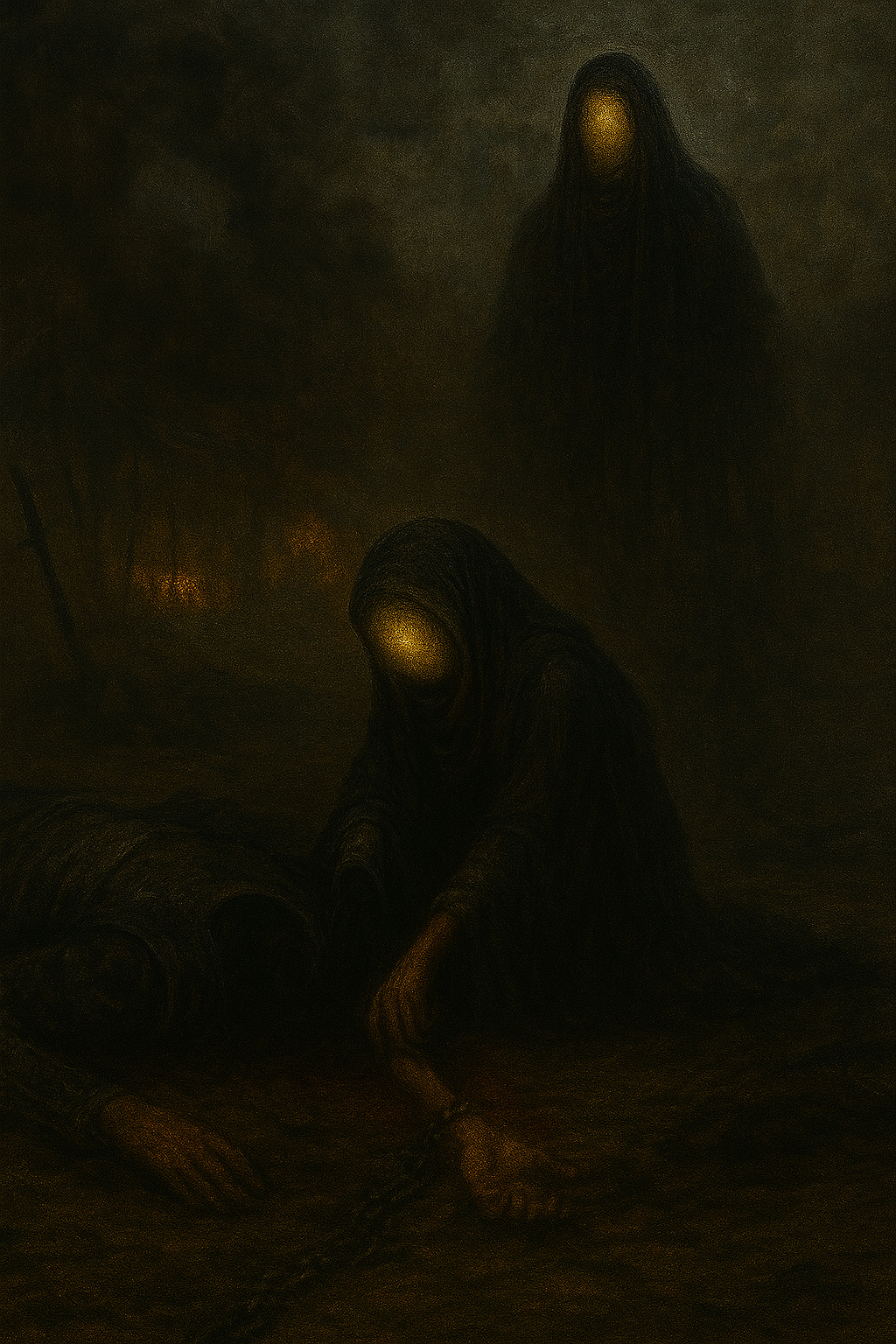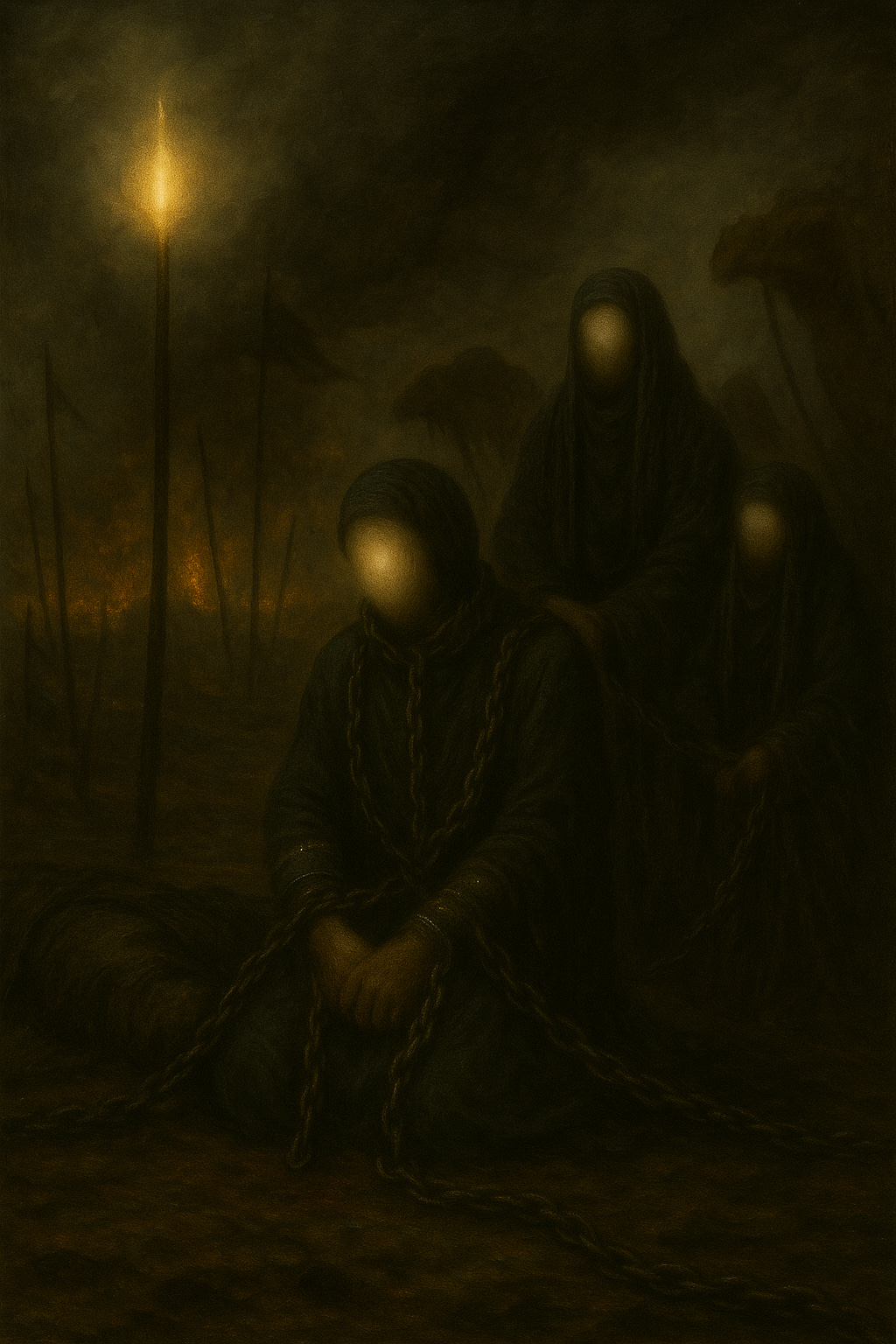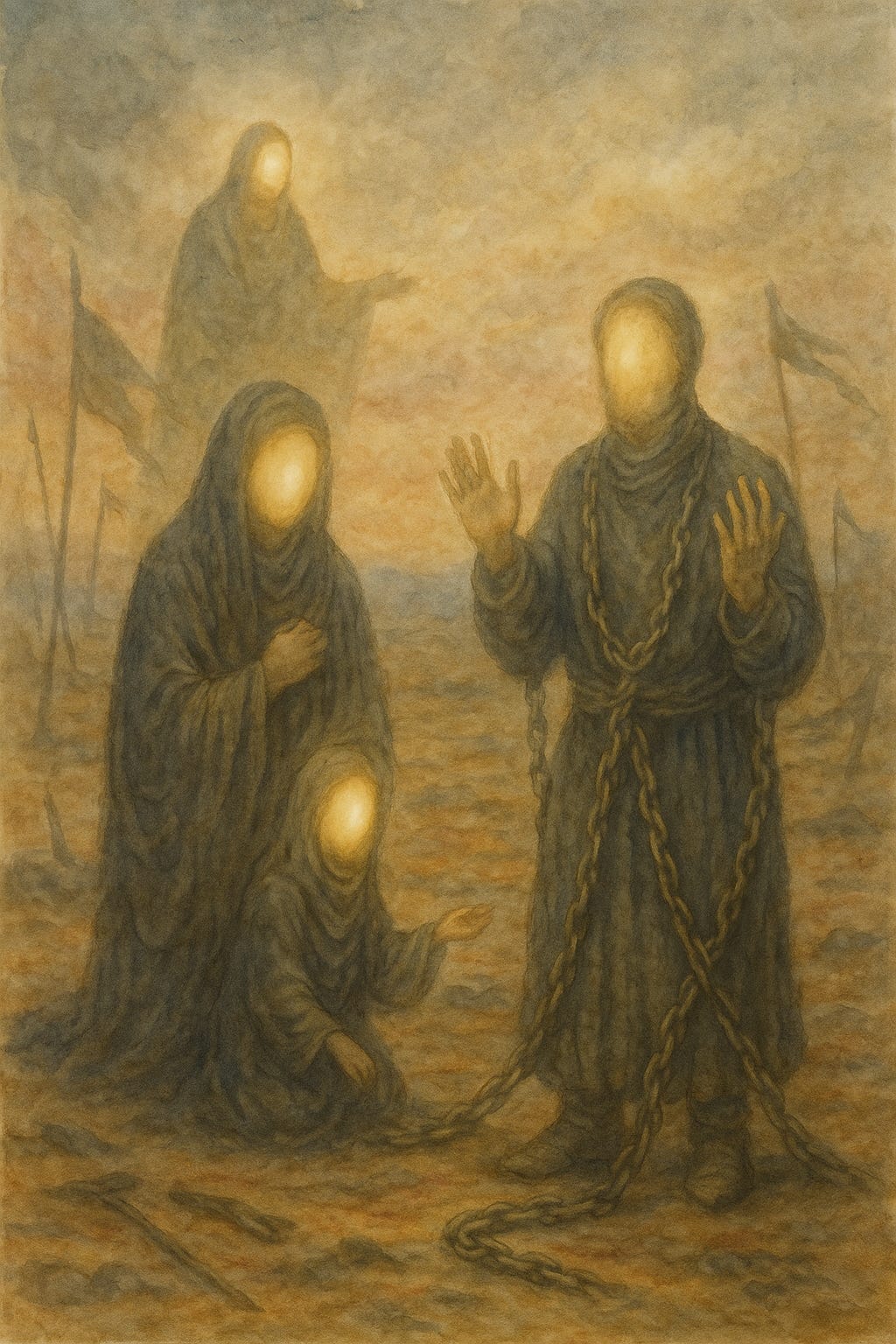[1] Arbaeen Maqtal - The Aftermath At Karbala
This is a series of maqatil (martyrdom narratives - devotional recitations recounting the suffering and sacrifice of the Ahl al-Bayt, the family of Prophet Muhammad). These are for Arbaeen 2025/1447
In His Name, the Most High
بِسْمِ ٱللّٰهِ ٱلرَّحْمٰنِ ٱلرَّحِيمِ
ٱلْحَمْدُ لِلّٰهِ رَبِّ ٱلْعَالَمِينَ وَصَلَّى ٱللّٰهُ عَلَىٰ سَيِّدِنَا مُحَمَّدٍ وَعَلَىٰ أَهْلِ بَيْتِهِ ٱلطَّيِّبِينَ ٱلطَّاهِرِينَ ٱلْمَعْصُومِينَ، أَمَّا بَعْدُ
السَّلَامُ عَلَيْكُمْ وَرَحْمَةُ اللَّهِ وَبَرَكَاتُهُIn the name of God, the Most Gracious, the Most Merciful.
All praise is due to God, the Lord of all worlds, and may blessings be upon our Master Muhammad and upon his pure, purified, and infallible household. As for what follows:
Peace be upon you, and the mercy of God, and His blessings.
Video of the Maqtal (Eulogy)
Audio of the Maqtal (Eulogy)
The Aftermath: When Martyrdom Lit the Sky Aflame
The wind had stilled, as though the desert itself were holding its breath. Across the plain lay the broken bodies of Hussain’s loyal companions, their lifeblood seeping into the thirsty sand until crimson rivulets traced the contours of Karbala’s scorched earth. Shields were split, standards toppled, and shattered lances thrust sky-ward like skeletal fingers accusing the heavens. A single riderless horse—its saddle dark with its master’s blood—galloped in frantic circles, neighing a lament no human throat could voice. Each hoof-beat sounded like a dirge across the silence that followed slaughter.
Black smoke coiled upward from the tents where women and children had sought refuge. Flames crackled through canvas and rope, devouring embroidered panels sewn by loving hands. The screams of frightened orphans blended with the roar of the blaze, and sparks drifted sky-high, carrying with them the last fragile hopes of the House of the Prophet.
Zainab’s Resolve
Amid the chaos rose Zainab bint Ali—sister of Hussain, granddaughter of Fatimah. Her robe was torn, her veil singed at the hem, yet her posture spoke of an unbroken spirit. She gathered the trembling children to her, pressing them close as embers floated around them like fiery hail. Her eyes lingered on the trampled body of her brother—now almost unrecognisable beneath the hooves that had ground bone into dust—yet no tear escaped her resolute gaze.
Within a smouldering tent lay her nephew, Ali ibn Hussain—Imam Sajjad—gravely ill and unable to stand. Zainab shielded him with her own body when soldiers stormed in, arms outstretched in defiance.
“He is but a sick man—have you no mercy left in your hearts?” she cried.
Some swords wavered; none dared strike her.
Sakina’s Search
In the confusion, young Sakina slipped from the women’s circle, drawn by hope of finding her father. Through smoke she wandered, tiny hands trembling as she called, “Baba, where are you?” Zainab’s heart seized. She searched frantically until she found the child kneeling beside Hussain’s lifeless form, clutching his severed hand. Gathering Sakina into her arms, she whispered comfort even as her own heart shattered anew.
Chains, Spears, and Captivity
When the fires dimmed, the victors bound the surviving family.
• Heavy shackles were clamped on the women of the Prophet’s household; ropes were tied from their cuffs to the rough saddles of weary camels.
• Imam Sajjad, too weak to walk, was forced upright, an iron chain coiled around his wrists and a spiked metal collar fastened about his neck—the cruel points biting every time he moved.
• Standard-bearers hoisted trophies atop spears: severed heads of the martyrs, lips still crimson.
High among them glimmered the head of Hussain. Onlookers gasped when, in the hush of dawn, a gentle murmur drifted from those blessed lips—verses of the Qur’an recited with the same serenity he had shown in life. Some swore they heard the opening of Surah Kahf, others the verse,
﴾فَسَيَكْفِيكَهُمُ اللَّهُ وَهُوَ السَّمِيعُ الْعَلِيمُ﴿ —“Allah will suffice you against them; He is the All-Hearing, the All-Knowing.”
Children stumbled beside camels; chains scraped across sand; and still Zainab moved among them, straightening a slipping rope here, soothing a sobbing child there. Each clang of iron proclaimed a new phase of struggle: the swords had fallen silent, but a harsher trial was beginning.
From Jihad al-Qital to Jihad al-Tabyeen
The physical jihad had ended in martyrdom; now dawned the Jihad of Clarification (Jihad al-Tabyeen). Zainab and Imam Sajjad, fettered yet unbowed, would become the tongue of Karbala. From the marketplace of Kufa to the court of Yazid in Damascus, they would turn captivity into a pulpit:
• Zainab, her wrists raw from chains, proclaiming, “By Allah, we saw nothing but beauty in His decree,” exposing tyranny while exalting sacrifice.
• Imam Sajjad, despite the spikes that tore his neck, answering mockery with Qur’anic eloquence, reminding crowds whose lineage stood before them.
On that brutal plain, bodies had fallen, but a narrative rose—borne on spear-points, chained ankles, and the steadfast voices of two survivors. Karbala’s crimson soil now carried a second seed: the obligation to speak truth unmasked, to transform grief into guidance, and to ensure that every echo of the wind across that silent battlefield would carry the cry, “Hal min naasir?”—Is there any helper?—to the conscience of every generation.
When the fires dimmed and the victors moved among the survivors, the cruelty did not end with chains and captivity. The women of the Prophet’s household, already exhausted and grief-stricken, were subjected to further humiliation. The soldiers tore away their veils, stripping them of the last remnants of dignity and privacy. Jewellery and precious belongings—earrings, bracelets, and cherished keepsakes—were snatched from trembling hands and bleeding ears. Even the simple garments that had survived the flames were ripped away, leaving the noble women exposed to the jeers and stares of the enemy.
Zainab, her head uncovered and her heart heavy, gathered the women and children close, shielding them as best she could from the cruelty that surrounded them. The pain of physical loss was deep, but the wound to their honour and sanctity was deeper still—a wound that would echo through generations, remembered in every retelling of Karbala’s tragedy.
Imam Mehdi A Witness
Yet, as the dust of Karbala settled and the chains of captivity dragged the Ahl al-Bayt through foreign streets, there was an unseen witness whose heart bled with every injustice: the Awaited Imam, al-Mahdi (AS). Though hidden from the eyes of the world, his spirit was present on that desolate plain, mourning the suffering of his forefathers and the agony of his beloved aunt Zainab, his ailing ancestor Sajjad, and the orphaned Sakina. Every lash, every chain, every tear shed by the children of Hussain was reflected in the heart of the one who would one day rise to avenge this tragedy and restore justice.
Imam Mahdi (AS) continues to witness not only the aftermath of Karbala, but the greater oppressions that have multiplied across the world today. He sees the innocent trampled, the voices of truth silenced, and the message of Hussain—once carried on the tongues of the oppressed—now often drowned out by the noise of heedlessness and worldly pursuits. The pulpits that were meant to echo the cry of “Hal min naasir?” and awaken hearts to the cause of justice and sacrifice, are too often transformed into stages for entertainment, self-promotion, and profit. The sacred memory of Karbala, instead of stirring souls to action and reform, is sometimes reduced to ritual and spectacle, its true message lost amid the clamour for applause and material gain.
The heart of the Imam of our time aches as he witnesses this betrayal—not only of his grandfather Hussain, but of the very purpose for which Karbala was written in blood. He waits for a generation that will rise, not just in mourning, but in understanding; not just in ritual, but in revolution of the soul. He yearns for pulpits that will once again become beacons of truth, for gatherings that will ignite the spirit of resistance against oppression, and for hearts that will answer the eternal call of Karbala with sincerity and action.
Until that day, the silent battlefield of Karbala is not just a memory, but a living challenge. Its dust still carries the footprints of the oppressed, its wind still whispers the names of the martyrs, and its legacy still calls out to every conscience: Will you be among those who merely recount the tragedy, or among those who rise to fulfil its message?



